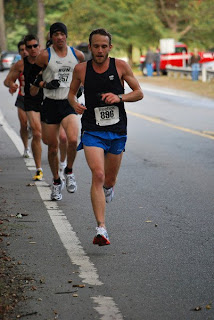"...it's inevitable that we look at our worthiest goals and hopes with a seriousness which is difficult to maintain, [but] ... Another ideal runs before us, a peculiar, seductive, dangerous ideal to which we wouldn't want to persuade anyone: ... the ideal of a spirit that plays naively, i.e. not deliberately but from overflowing abundance and power, with everything that was hitherto called holy, good, untouchable, divine, ... it is only with this spirit that the great seriousness really emerges." --Nietzsche, The Gay Science My buddy Mike wrote a nice piece on how he started running, and I've been meaning to link to it for a couple weeks now. His experience was much like mine. I think it pairs nicely with this Runner's World piece on the tenth a...
